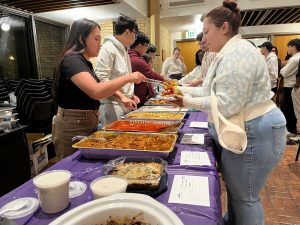Concordia students will notice something missing in Anderson Commons this fall. The plates, utensils, and glasses are all there, but there is no longer anything to rest them on as you move from station to station. Anderson Commons is now a trayless dining facility. The move, led by the Sustainability Task Force, Student Government Association, Student Environmental Alliance, and President Pamela Jolicoeur, will conserve water and electricity and reduce food waste and chemical usage.
Concordia piloted trayless dining for two days in 2008. Food waste was reduced by about 110 pounds, or 40 percent. Liquid waste was reduced by 7.35 quarts, or 43 percent. Additionally, each tray needs a half gallon of heated water to clean. Each person going through Anderson trayless will save almost 500 gallons of water annually.
“Those numbers are very important for it [going trayless],” said Junior Erik George, president of the Student Environmental Alliance.
Jim Aageson, chair of the Sustainability Task Force, said that the two-day test was part of a year of study and demonstration to determine the best plan for reducing waste and conserving resources at Concordia. The Sustainability Task Force met in May and decided that trayless was the most satisfactory option and it only made sense to start trayless dining in June before the incoming students arrived for registration, rather than pulling the trays within the academic year.
“It seemed to many of us that we couldn’t postpone it any longer,” Aageson said. He emphasized that many pieces had to come into play before the announcement could be made, but the Sustainability Working Groups, Dining Services, and many other organizations on campus worked hard to make trayless happen.
Concordia is not the first school in the region to go trayless. North Dakota State University, the University of Minnesota, Concordia University-St. Paul, and Hamline have all gone trayless within the past two years.
“So many institutions have already done this,” Aageson said. “The evidence is overwhelming.”
Trays are not available to any Anderson Commons guests, unless they appeal to the exemption committee. Exemptions will be given only for compelling reasons such a temporary or permanent disability or injury, a documented requirement to consume an unusually large quantity of food combined with a short amount of time for the meal (e.g. athletes who only have a short break between classes), or other “reasonable, demonstrable, and unusual condition,” according to the “Trayless Dining FAQ” article on the Concordia website.
Senior Erik Weiss is one student who is not in favor of the move to trayless. “If I am paying $10 a meal, I would expect convenience,” he said. “Not having a tray is inconvenient.”
Weiss believes that trayless dining in Anderson will lead to other problems, like an increased number of broken dishes from people trying to balance multiple dishes at one time and an increased dining time due to people needing to make multiple trips to get their meal, which could be especially aggravating during rush times.
“I don’t have a problem with going green or making the world a better place, but there are places to do it and I don’t believe this is one of them,” Weiss said. “I understand that going trayless reduces waste but how about trying to educate students first rather than taking away a convenience and service that they have already paid for.”
George said he is expecting some students to be upset by the move, but is confident they’ll adapt to trayless with time.
“Change is always hard, it will just take some time to get used to,” said George.
Aageson agrees that students will become accustomed to trayless, and said reducing waste and conserving resources is a component of Becoming Responsibly Engaged in the World. Aageson said that BREW is not just a theoretical concept but involves behavior and practice as well.
“I’m sure there is a nuisance factor, an inconvenience factor,” he said, “but the bigger question that I would like us as a community to think about is, ‘How can we in our daily activities be responsible and engage the world in a constructive way?’”
Sabrina Whiting, marketing supervisor for Dining Services, said the two-day study last year brought mixed reactions, but now more people are adjusting with more education. So far this year, she’s heard a “few grumbles,” but overall attitudes toward trayless are much more positive.
Dining Services plans to conduct waste studies again within the next month to find out if the 2008 study results will be matched, or if they will be reducing and conserving even more.
“It’s just a good opportunity for everyone to get involved in a green initiative,” Whiting said, “and see how little changes make a difference.”




Be First to Comment